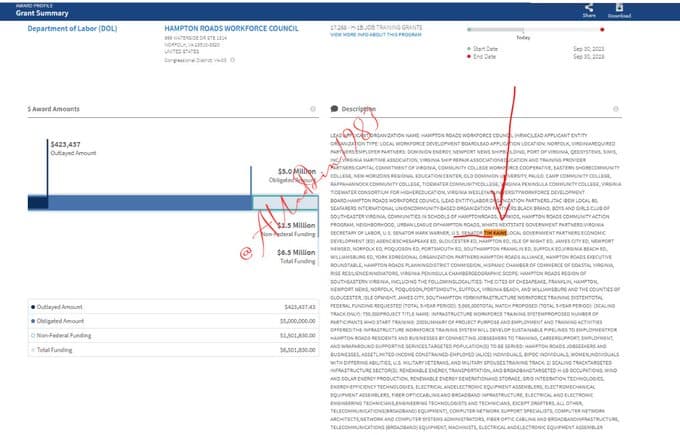
The Taxpayer Money Trail: Inside $190 Billion in Questionable Federal Spending
An Deep Dive Investigation Into Government Contracts, Grants, and International Aid
Every dollar spent by the federal government is supposed to be publicly documented. What these documents reveal, however, tells a story of waste, fraud, and questionable priorities that few Americans understand—until they see the receipts.
Using data extracted directly from USASpending.gov, this investigation traces approximately $190 billion in federal expenditures across defense contracts, healthcare programs, international aid, and domestic grants. The patterns that emerge raise urgent questions about accountability, oversight, and whether taxpayer interests are truly being served.
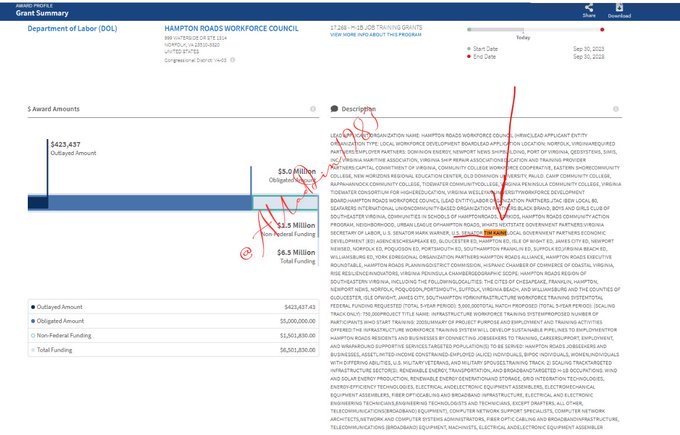
Defense Contractors: Small Business or Corporate Shell Game?
The Celestar Corporation Network
When a former FBI Terrorist Screening Center contractor reached out with concerns about her employer, it opened a window into how defense contractors structure their operations. Celestar Corporation, based in Tampa, Florida, markets itself as a small, veteran-owned business—a designation that qualifies firms for preferential contract treatment.
The reality is more complex. Federal contractor databases reveal that Celestar operates through a network of subsidiaries under parent company Celestar Holdings Corporation, including Metis Celestar JV LLC and Metistar LLC. The whistleblower reported being accused of harassment without substantive basis or identifiable complainants, yet lost her position while the company continued securing government contracts with the FBI, Defense Intelligence Agency (DIA), and other agencies.
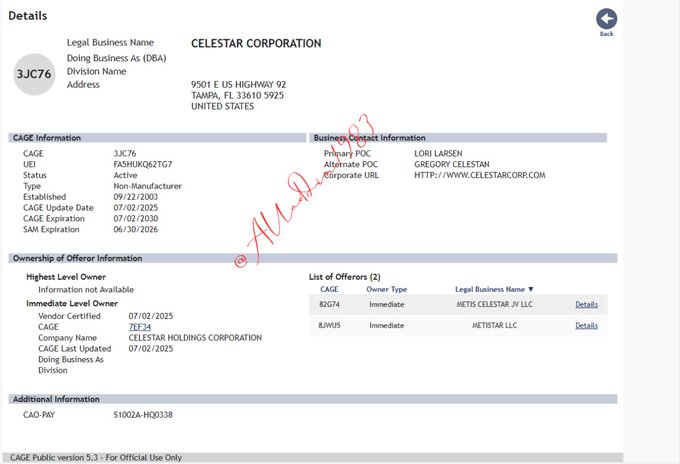
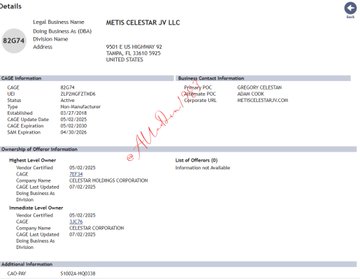
This case illustrates a broader pattern: contractors can maintain lucrative government relationships even amid personnel controversies that would sink smaller firms lacking sophisticated corporate structures.
The Contract Protest Loophole
Perhaps no mechanism better demonstrates how the system favors contractors over taxpayers than the protest process. When a company loses a contract rebid, it can file a protest that automatically delays the new contractor's start date by 90 days.
Strategic Alliance Solutions LLC holds a contract worth $93.8 million with potential to reach $210.4 million for "TEAMS-Next Facilities, Logistics, and Environmental" services. The contract record explicitly states: "THE PERIOD OF PERFORMANCE START DATE WAS CHANGED TO 09/04/2023 AND THE COMPLETION DATE TO 09/05/2006 ON P00009 DUE TO PROTEST."
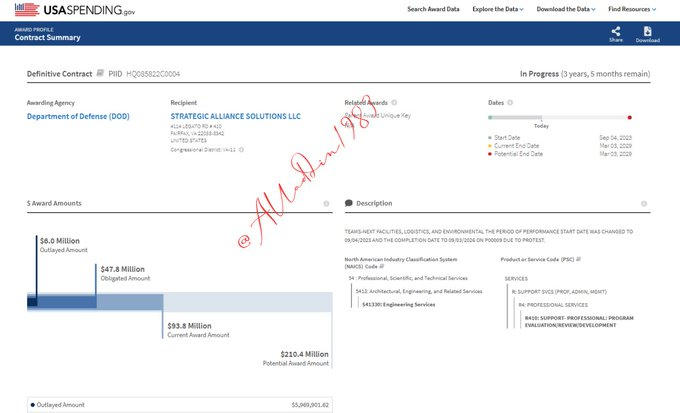
The losing company doesn't regain the contract through protest—they simply continue collecting taxpayer funds for three additional months without performing new work. This practice must stop immediately.
Healthcare: Where Billions Disappear Into State Coffers
Illinois: A $163 Billion Case Study
Between 2021 and 2025, the Department of Health and Human Services allocated $163.42 billion to Illinois. The state's population of 12.6 million means over $13,000 per resident in just four years.
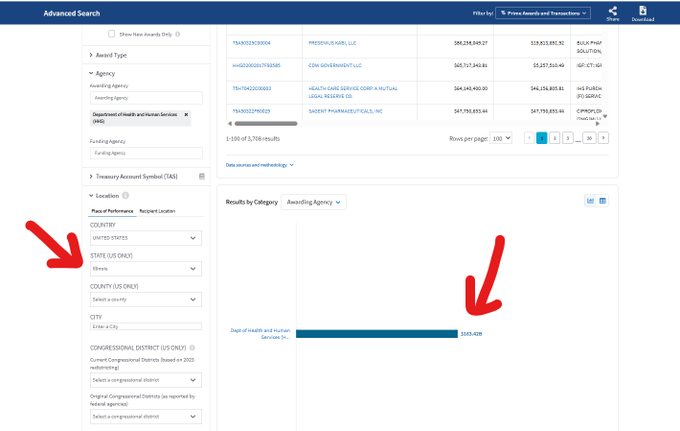
Federal spending data shows major pharmaceutical and healthcare service companies receiving massive contracts:
-
Fresenius Kabi LLC: Tens of millions for "bulk pharmaceutical solutions"
-
Health Care Service Corporation: Over $64 million for "insurance purchases for service"
-
Sagent Pharmaceuticals: Over $47 million for ciprofloxacin

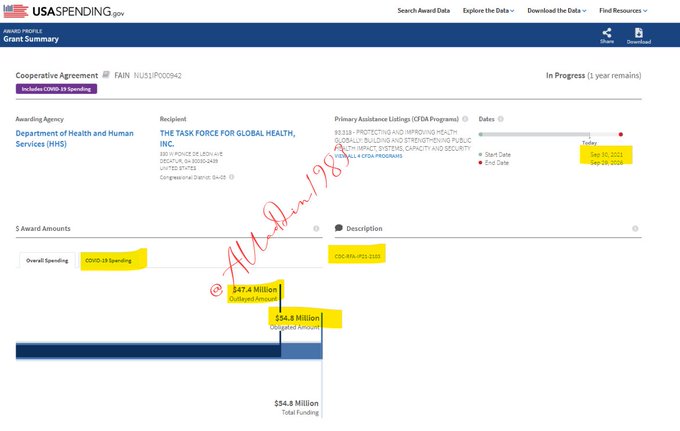
These massive contracts raise questions about pricing, necessity, and oversight.
Portland's $5 Billion Federal Funding
Portland, Oregon received over $5 billion in total federal grants and contracts between 2021 and 2025. The Department of Defense and Department of Health and Human Services each spent approximately $1.66 billion in the city during this period.
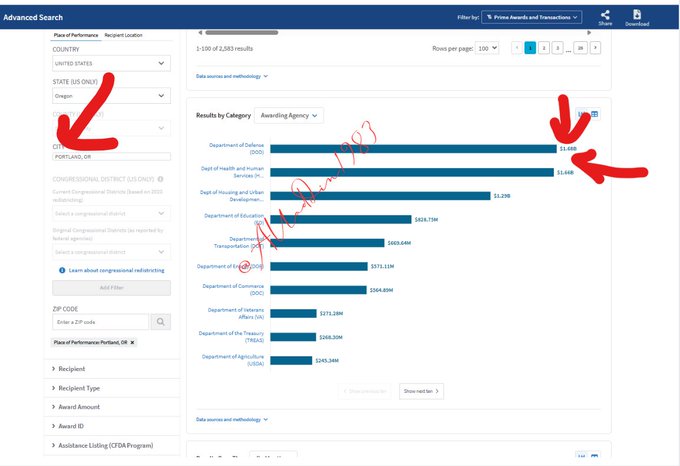
Following controversies around journalist arrests and local governance issues, questions arise about whether federal funding should continue flowing to jurisdictions that may not align with constitutional principles.
Specialized Spending: From Children's Hospitals to Yoga
Seattle Children's Hospital received $8.5 million in federal grants between 2020 and 2025, with the largest award (UM3DA05014) totaling over $4 million for projects described as "using smart beneficial" approaches.

More eyebrow-raising: HHS spending on yoga programs reached $187.54 million, with spending dramatically increasing after 2020. While wellness programs have value, this level of expenditure demands justification and comparison to other healthcare priorities.
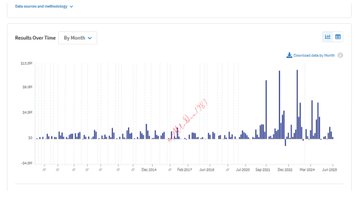
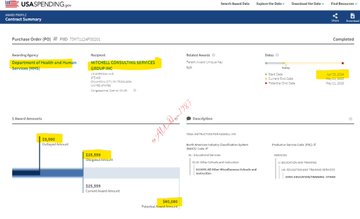
The mRNA Timeline: Defense Funding Before the Pandemic
Long before COVID-19 became a global crisis, the Department of Defense was investing heavily in mRNA technology. A 2013 grant (W911NF1310417) awarded $57.9 million to Moderna TX for "modified mRNA technology for production of antibodies for immune prophylaxis." The project ran from October 2013 through September 2019, with $19.3 million outlayed.
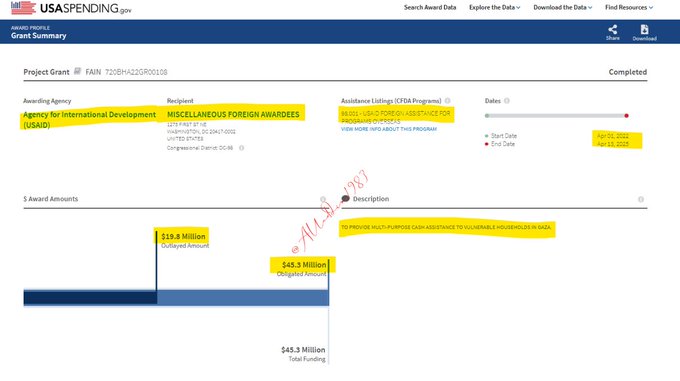
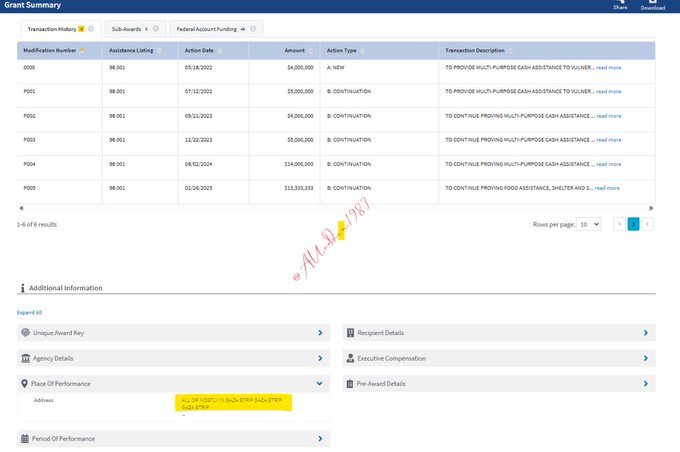
This timeline reveals that substantial government investment in mRNA platforms predated the pandemic by years, funded through defense rather than health agencies. The relationship between military research priorities and pharmaceutical development deserves greater scrutiny and public understanding.
International Aid: The Multi-Billion Dollar Question
UN Organizations and Oversight Gaps
The United Nations High Commissioner for Refugees (UNHCR) has received $8.45 billion from U.S. taxpayers through USAID and the State Department. This includes three separate grants exceeding $1 billion each, channeled through the Haut Commissariat des Nations Unies pour les Réfugiés in Switzerland.
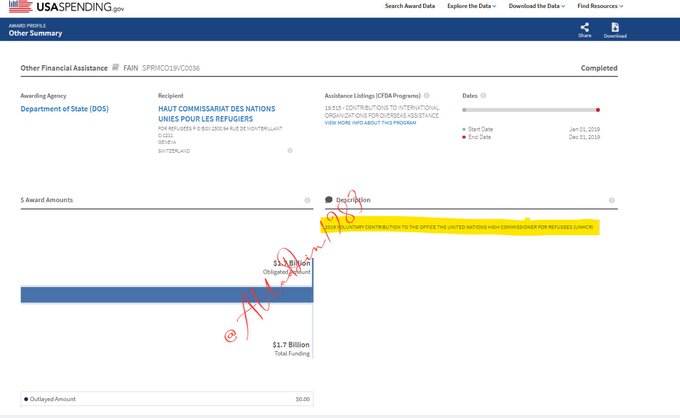
A single 2019 grant (SPRMCO19VC0036) totaled $1.7 billion for "voluntary contribution to the Office of the United Nations High Commissioner for Refugees." The grant ran from January 1, 2019, through December 31, 2019—$1.7 billion spent in a single calendar year.
UNHCR has been linked to policies influencing illegal immigration into the European Union, raising questions about whether American taxpayer dollars are funding migration flows that destabilize allied nations.
IOM: Nearly $10 Billion Despite Fraud
Even more concerning is the International Organization for Migration (IOM), which has collected nearly $10 billion from the U.S. government despite documented fraud. The spending breakdown by agency:
-
Department of State: $95.95 million
-
USAID: $30.95 million
-
Department of Health and Human Services: $3.73 billion
-
Department of Homeland Security: $5.82 billion
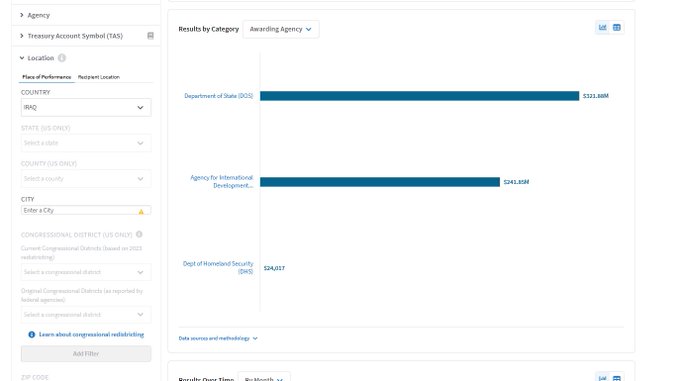


In 2010, IOM was found to have falsified Special Immigrant Visa (SIV) and I-94 application documents, leading to temporary suspension of the SIV program by the State Department. The scheme involved charging applicants $10,000 to use authentic documents originally belonging to individuals who worked with coalition forces, simply altering names to facilitate immigration.
Yet on July 15, 2023—thirteen years after the fraud was exposed—IOM Germany received a $31.5 million grant specifically to facilitate SIV application processing at the Hine Ordnance Barracks transit center in Rheinland-Pfalz, Germany.
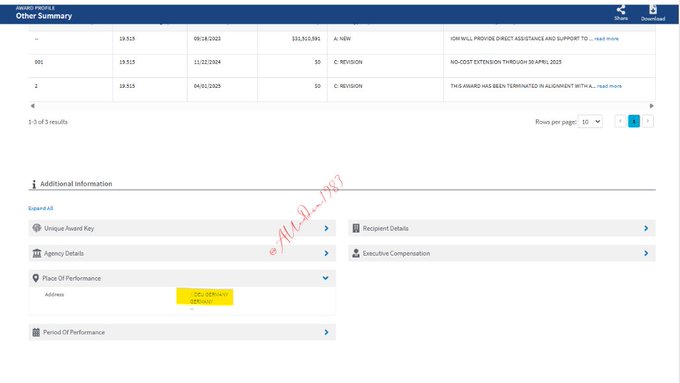
One DHS contract explicitly details "lodging and transportation for illegal migrants in Africa"—raising questions about whether taxpayer dollars are facilitating illegal immigration rather than protecting legitimate refugees.

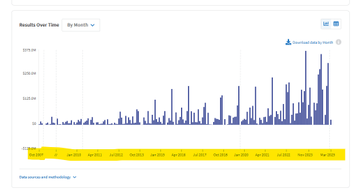
Refugee Resettlement: Domestic Pipeline
Catholic Charities Diocese of Fort Worth secured $133.3 million from HHS for refugee cash and medical assistance programs in Texas, with $43.3 million already spent. The contract remains active through 2026, representing ongoing taxpayer obligations.



Ukraine: Pickups, Insurance, and "ADD $"
On July 10, 2025—just days before this analysis—the State Department spent $41.4 million purchasing 900 pickup trucks for Ukraine. That's approximately $46,000 per vehicle—well above commercial prices for heavy-duty pickups.

Additional spending includes:
-
Life insurance for local employees
-
$109,900 for social media funding for local streamers
-
$1,942,953 for healthcare for local staff
-
$2.7 millionfor a contract whose description simply reads "ADD $" without further explanation
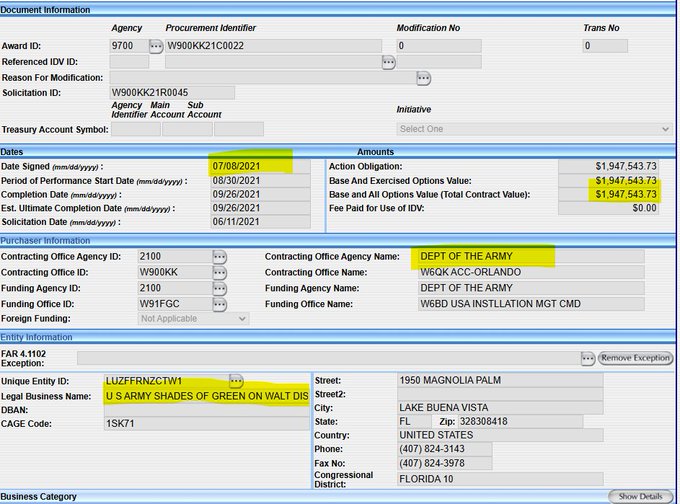

Chemonics International received $44 million on January 16, 2025, to funnel money into Gaza. The contract from USAID runs through September 2029, with $58.675 million in total contract value.
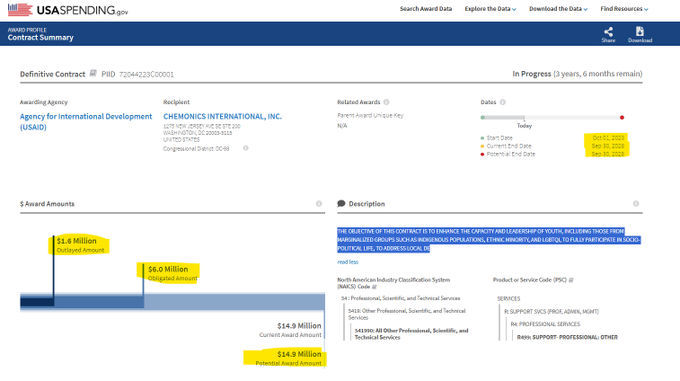
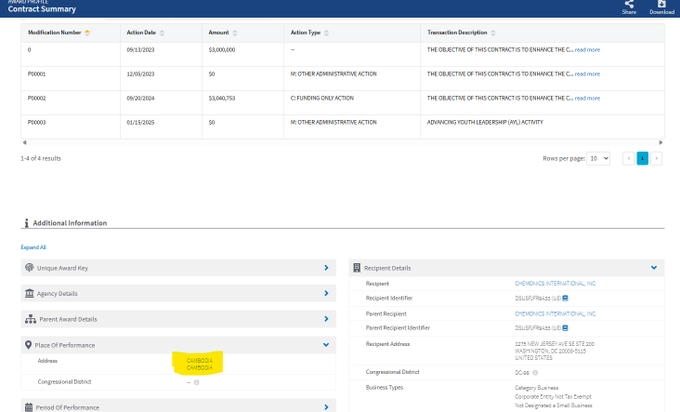
Domestic Grants: High Cost, Low Output
Virginia Workforce Training: $32,500 Per Person
Senator Tim Kaine sponsored a grant totaling $6.5 million to train just 200 people through the Hampton Roads Workforce Council. The Infrastructure Workforce Training System requested $5 million in federal funding over five years, plus $750,000 in matching funds, to create "sustainable pipelines to employment" in renewable energy, transportation, and broadband.

The grant application lists numerous partner organizations—from Dominion Energy to local community colleges to labor unions—raising questions about how much of the funding actually reaches trainees versus supporting partner organizations' overhead.
North Carolina Election Funding: $40 Million
The North Carolina State Board of Elections received approximately $40 million in federal funding for election initiatives. The largest awards include:
-
$24.96 million "to improve federal offices"
-
$10.66 million "to prevent domestic" (description truncated in records)
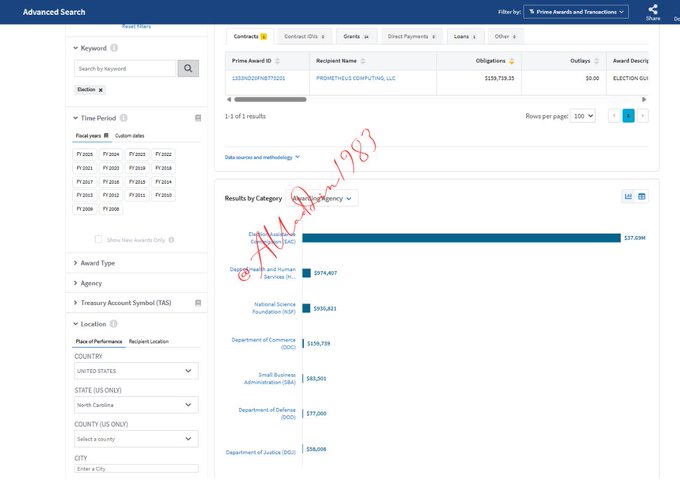
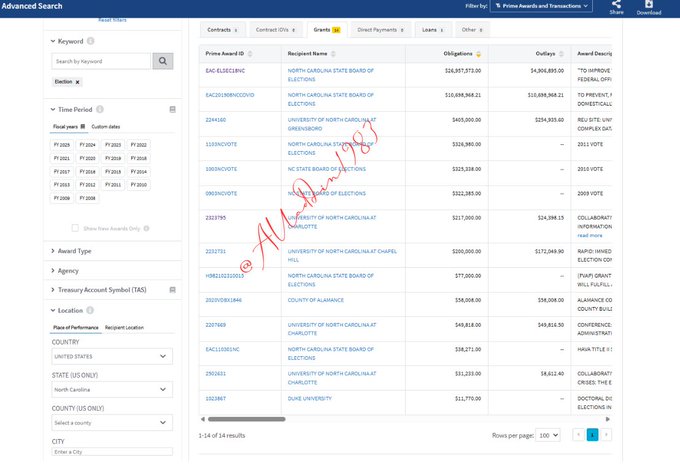
Universities including UNC-Greensboro ($405,000), UNC-Chapel Hill ($200,000), and Duke University also received grants for election-related research.
Whether these funds supported specific partisan candidates or initiatives requires Department of Justice investigation to ensure proper use of taxpayer dollars in election administration.
Media, Communications, and Information Control
Wikipedia and Social Media: $55 Million
Over $55 million has been channeled into Wikipedia and social media platforms through grants to companies, hospitals, and academic institutions. The Smithsonian Institution received $13.7 million from NASA for the Astrophysics Data System (ADS), which serves as a bibliographic database that aggregates scholarly resources and connects directly with Wikipedia for reference materials.
[Grant record showing Smithsonian receiving $13.7M from NASA for Astrophysics Data System]
[Description of ADS system showing Wikipedia integration]
Pre-Election PR Surge: ARCADIS
ARCADIS U.S., Inc. received nearly $200 million in contracts across different agencies for podcast and PR work. The spending breakdown by agency shows:
-
State Department: $95.95 million
-
USAID: $30.95 million
-
HHS: Billions (cumulative across all contractors)
-
DHS: Billions (cumulative)
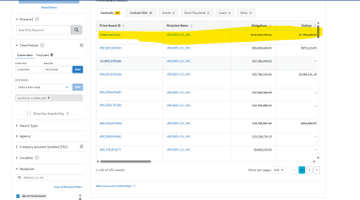
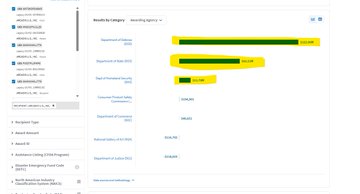

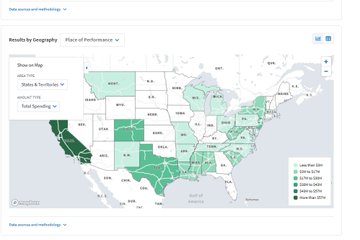

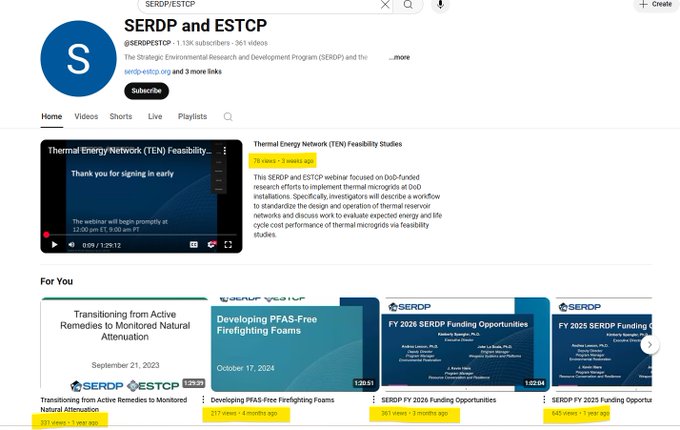
Most notably, spending spiked dramatically in September 2024—immediately before the presidential election—raising questions about taxpayer dollars supporting government messaging during campaign season.
Many of these contracts remain active, meaning funds can potentially be clawed back and contracts terminated.
Censorship Infrastructure
The U.S. Agency for Global Media (USAGM) awarded a $6.4 million contract in 2011 for "open source multimedia web proxy servers and virtual private network (VPN) servers as a tool to further its internet anti-censorship efforts." This reveals that government investment in information control infrastructure extends back over a decade, predating recent concerns about federal involvement in online speech.
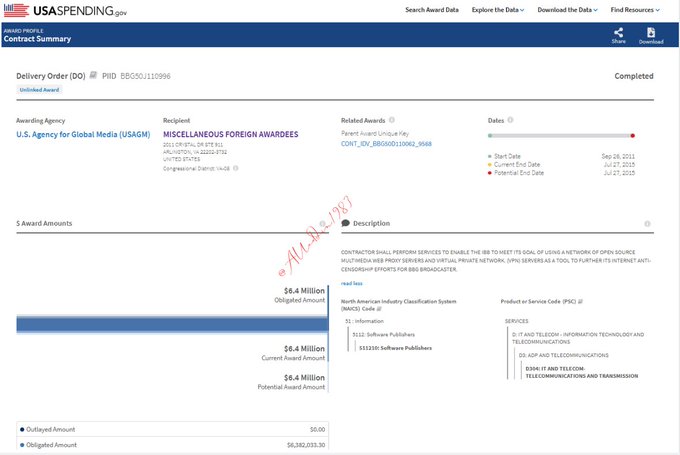
When DEI Meets Defense Spending
The Air Force awarded Gapingvoid Culture Design Group LLC a contract for $6,303,391.02, with $5 million already spent between August 2024 and September 2025. The contract description states it's for "Advanced Battle Management Systems"—language suggesting sophisticated military technology.
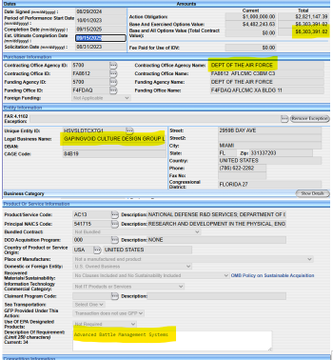



A visit to Gapingvoid's website tells a different story. The company is a DEI training firm with no involvement in warfighting technologies. Their website prominently features content stating "DEI is under attack and companies must fight back."
This represents either deliberate misdescription in contract documentation or a fundamental disconnect between stated purposes and actual deliverables.
Luxury Accommodations and Political Connections
The U.S. government spent over $70 million on Hyatt hotel rooms, with the Department of Defense accounting for $51.8 million. A single DOD contract for Hyatt accommodations totaled $16.9 million between January and September 2021.
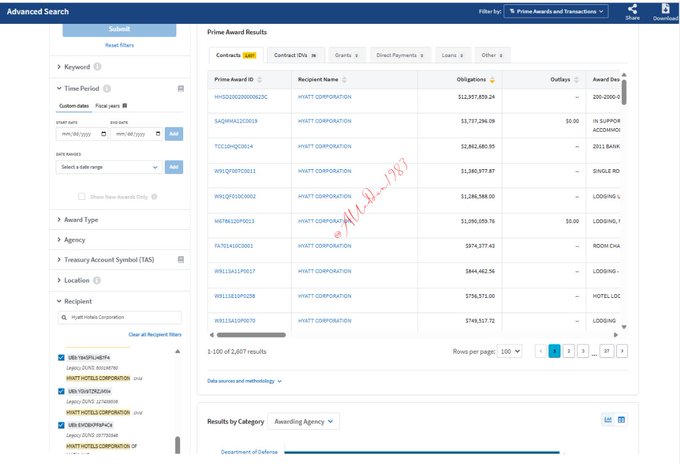
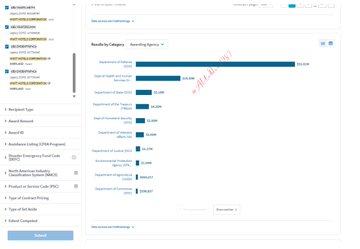
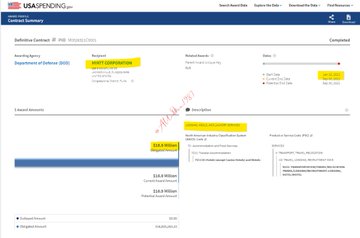
The Pritzker family—prominent political donors and officeholders—holds a 3.8% equity stake and 88.8% voting power in Hyatt Hotels Corporation. While government employees require lodging during official travel, the concentration of spending at a single chain with such clear political connections warrants scrutiny.
Small-Scale Waste That Adds Up
Pizza, Ovens, and Incremental Spending
Federal employees charged taxpayer dollars for pizza in small incremental amounts like $30 and $45. The Federal Acquisition Service had 179 such contracts, while the Agriculture Department awarded $1.1 million to Original Pizza Crust Company for what records describe as "meat boxes."
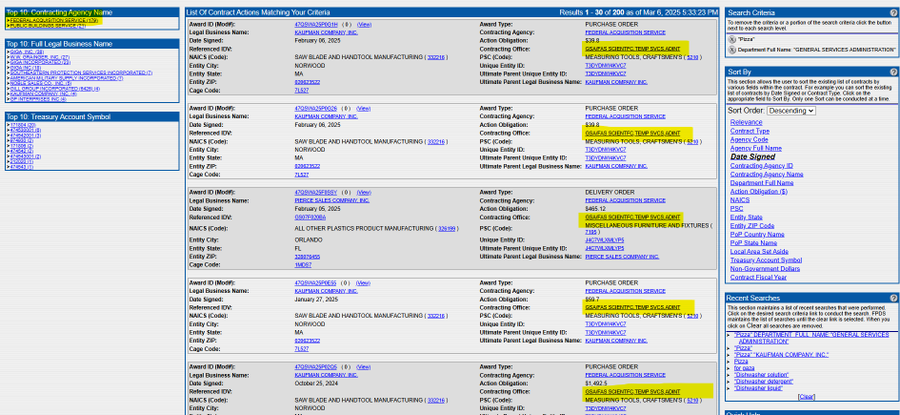

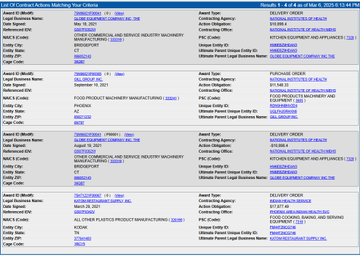
The National Institutes of Health spent over $40,000 on pizza ovens. Given that NIH is a research institution with cafeterias typically operated by contracted food services, why does the agency need to purchase commercial pizza ovens?
GSA Inflatables: $8.8 Million
The General Services Administration awarded $5.8 million to Inflatable 2000 Inc. on March 10, 2025, and $3 million to All-Star Inflatables, Inc. on March 11, 2025.
[GSA contract to Inflatable 2000 Inc. for $5.8M dated March 10, 2025]
[GSA contract to All-Star Inflatables Inc. for $3M dated March 11, 2025]
USASpending.gov contract records show both awards for "games, toys, and wheeled goods" with minimal additional description. Without additional context, nearly $9 million in inflatable contracts over two consecutive days demands explanation about purpose, procurement process, and value received.
[Contract descriptions showing "games, toys, and wheeled goods" category with minimal detail]
Congressional Connections and Constituent Services
Representative Ilhan Omar requested $1 million in sponsorship allocation for Avivo, a Minneapolis nonprofit focused on social justice, affordable housing, and community development. Prior to her election, Avivo was reportedly positioned to receive local government contracts, and the organization continues receiving Labor Department funding.
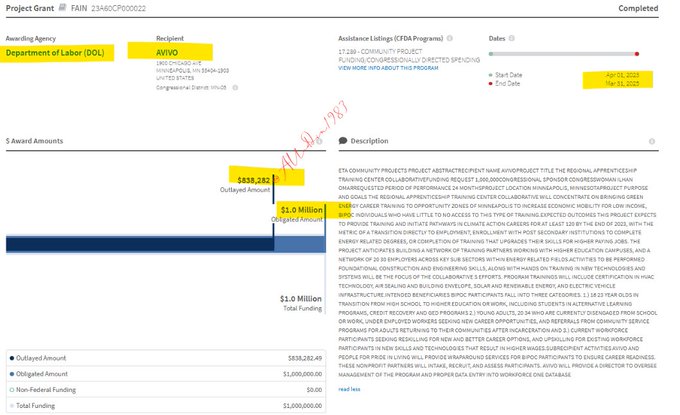
Representative Greg Casar has maintained close relationships with unions that receive substantial government contracts since 2013. The Building Trade Union donated $64,000 to his 2023 campaign, while the Service Employees International Union also provided significant support.

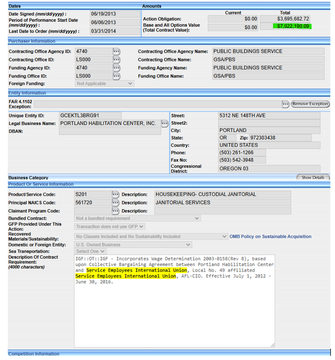

Action Facilities Management, Inc., which holds a GSA contract worth over $9.7 million, operates under a Collective Bargaining Agreement with the Service Employees International Union, Local 3283.
Similarly, Portland Habilitation Center maintains a contract with SEIU Local 49, showing how union relationships intertwine with federal contracting.
Migrant Programs and Research Spending
Columbia University: Mental Health Study
On May 9, 2023, HHS awarded $1.4 million to The Trustees of Columbia University for a study titled "Mental Health of Latino Adolescent Who Migrate Without a Parent: Understanding Risk and Identifying Resilience and Coping Strategies." The grant, active through November 2028, studies PTSD, depression, and anxiety among unaccompanied migrant teens.
A pilot study called "CAMINANDO" recruited 74 Latino teens who migrated as unaccompanied minors and found correlations between violence/hunger exposure and poorer mental health. The new 18-month study proposes recruiting 400 teens to further explore these issues.
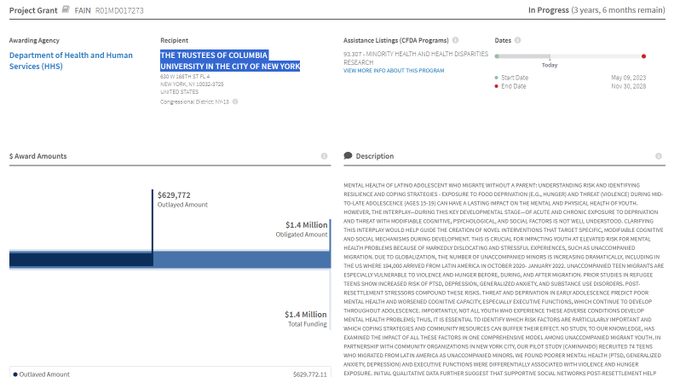
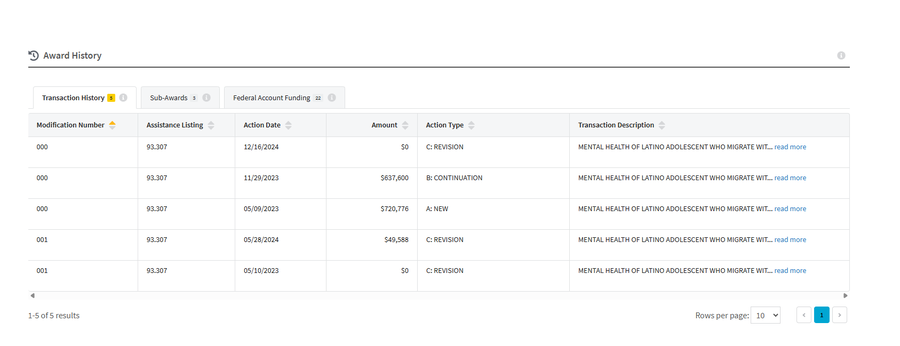
While mental health research has merit, critics question whether $1.4 million represents appropriate spending priorities when 104,000 unaccompanied minors arrived from Latin America in October 2020-January 2022 alone.
AIDS Healthcare Foundation: Multi-Agency Funding
The AIDS Healthcare Foundation in California collected over $20 million in government grants. Department of Housing and Urban Development records show a $10 million award in 2024 for the "Tenant Resource Network Program," active through December 2028.

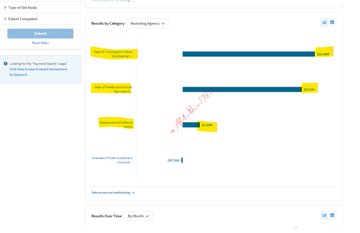
HHS contributed $9.01 million, while the Department of Defense added $1.3 million.
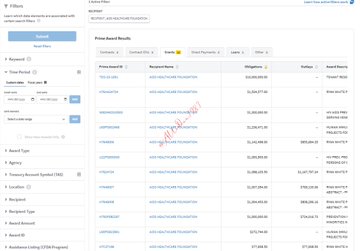
TreePeople: Environmental Grants
TreePeople, Inc., a California-based nonprofit, received approximately $11 million in government funding, including an $8 million grant from the Department of Agriculture active from April 2024 through March 2029 under the "Inflation Reduction Act Urban Community Forestry Program."
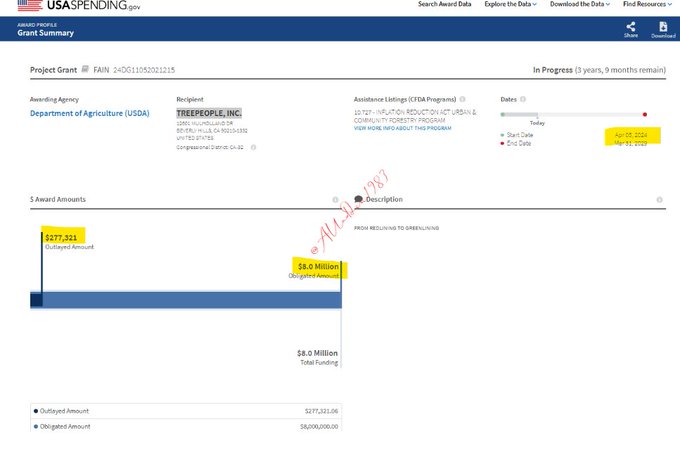
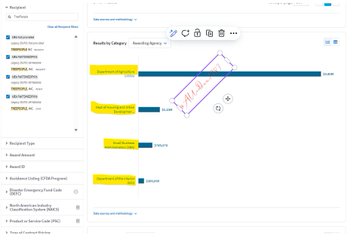
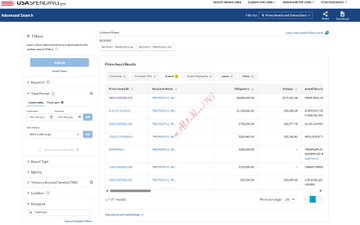
Obscure Agencies and Foreign Contracts
Millennium Challenge Corporation
The enigmatic Millennium Challenge Corporation—a government agency structured as a corporation—operates with minimal public visibility. On April 18, 2025, MCC renewed a $4.36 million contract with Family Health International in Durham, NC, for "HCD Social and Behavioral Change (SBC) Consulting Services."
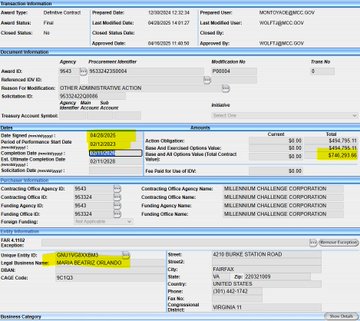
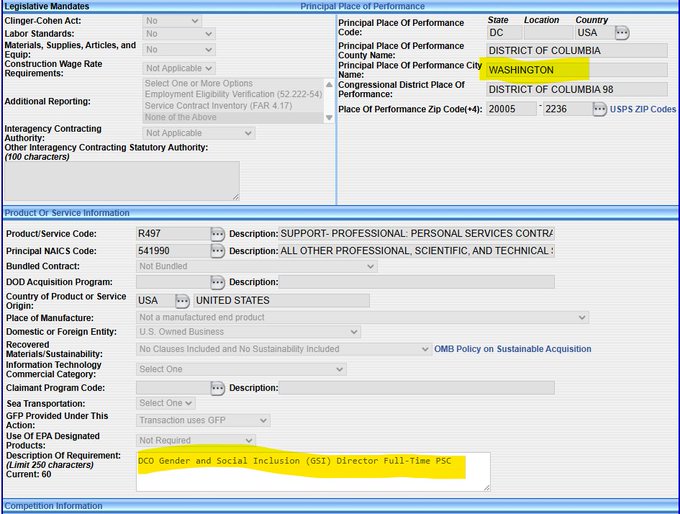
On April 22, 2025, MCC extended a contract worth $2.06 million to A2F Consulting LLC in Niger for the "Independent Evaluation of the Niger PRAPS Activity." The contract, originally signed June 5, 2019, raises questions about long-term foreign aid commitments and evaluation processes.
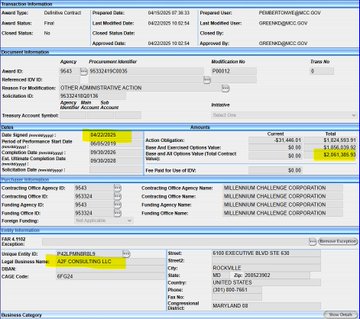

State Department: Iran Press Assistant
On April 16, 2025, the State Department contracted Great Hill Solutions LLC for $508,756.15 to support an "Iran Press Assistant" role in the Bureau of Near Eastern Affairs. The contract modification added funding to an existing agreement, with the period of performance running through June 2026.
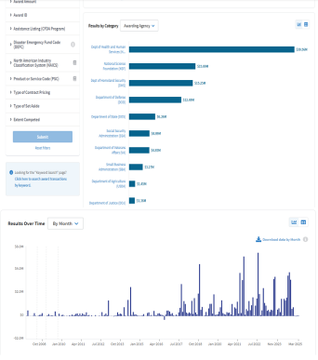
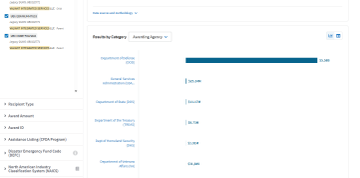
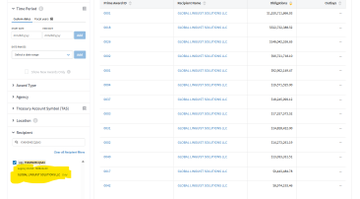
Critics question why taxpayer dollars fund PR services related to Iran.
COVID-19 Contracts and Questionable Math
The Department of Health and Human Services awarded $107.5 million to Retractable Technologies Inc. in Maryland for 1ml syringes with 25G x 1 needles between February 2021 and February 2022. The purchase order shows $107.5 million outlayed and obligated, with the contract description reading "TO PROCURE 1ML SYRINGE W 25GX1 NEEDLES FOR COVID-19."
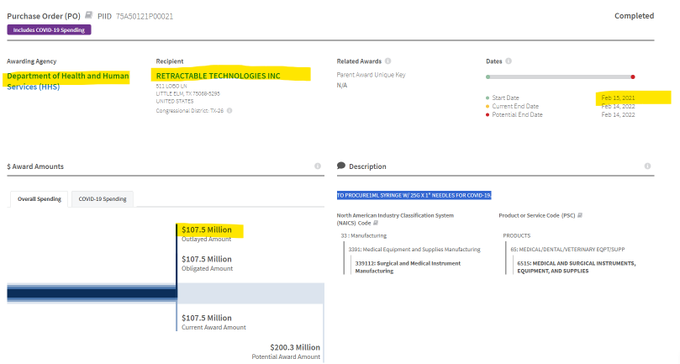
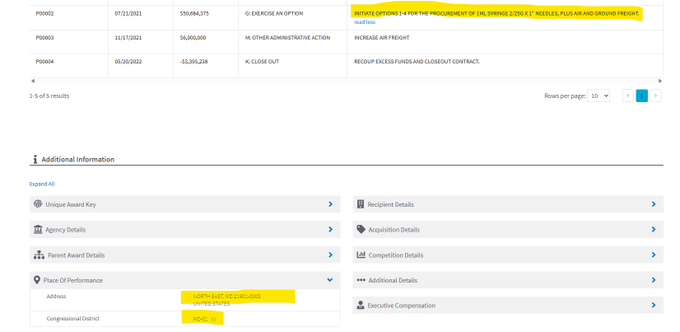
Given that individual needles cost $0.08-$0.20, and Maryland's 2023 population was 6,180,253, questions arise about the quantity purchased and doses administered.
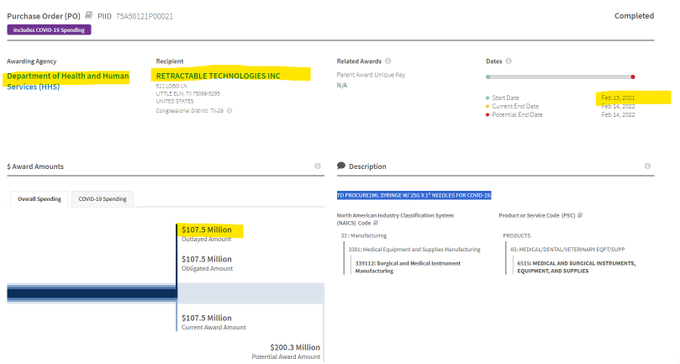
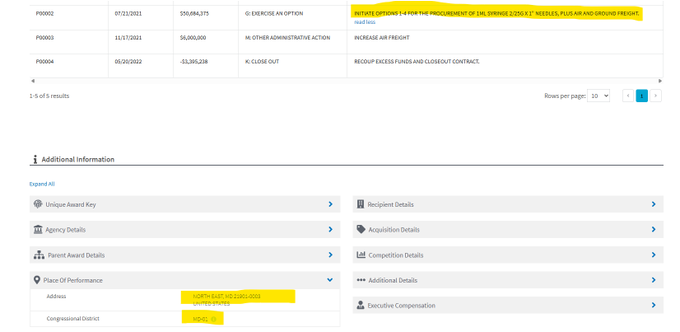
The contract modifications show additional funding exercises, with one modification recouping excess funds and closing out the contract after spending $200.3 million in potential total value.
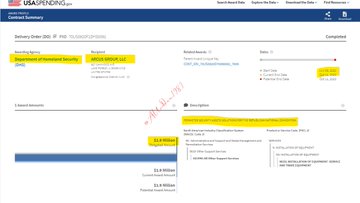
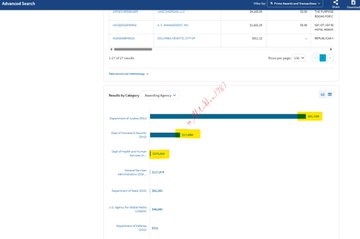
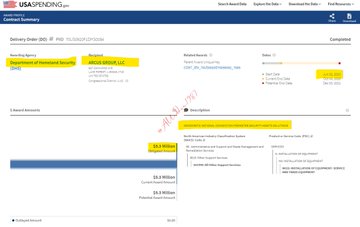
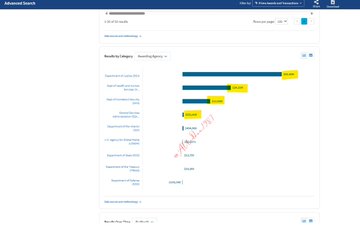
DOJ Explosive Analysis: $47 Million
The Department of Justice allocated $47 million for analyzing terrorist explosive devices, yet the DNC/RNC pipe bomber remains at large. Questions arise about contract effectiveness when high-profile domestic cases remain unsolved despite significant investment in forensic capabilities.
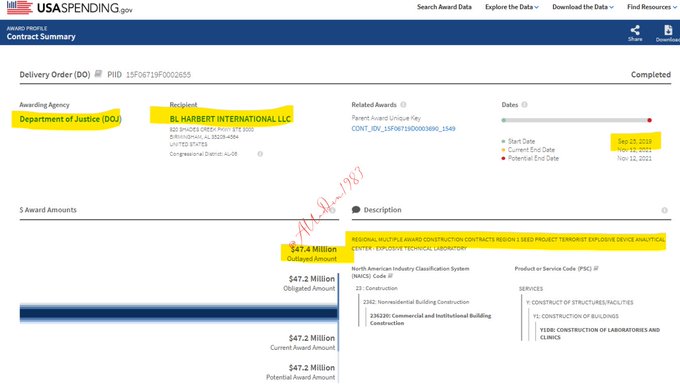
The Accountability Crisis
These spending patterns reveal systemic failures:
Proportionality Breakdown: Training 200 workers for $6.5 million, or spending nearly $200 million on podcast production, demonstrates fundamental disconnect between expenditure and value delivered.
Contractor Qualification Gaps: A DEI training company receiving Air Force funding for "battle management systems" exemplifies how contract descriptions may deliberately obscure actual work performed.
Fraud History Ignored: Organizations like IOM continue receiving billions despite documented fraud, with no apparent consequences or enhanced oversight.
Political Connection Benefits: Hotels owned by politically prominent families, nonprofits linked to congressional members, and unions supporting specific politicians all receive substantial federal funding through processes that lack transparency.
International Organization Black Holes: Billions flow to UN agencies with minimal oversight about ultimate use, no metrics for success, and limited accountability when fraud is discovered.
System Gaming: The protest mechanism allows companies to extract three additional months of payments without performing work, solely by filing paperwork that delays successor contractors.
Electoral Timing: Massive spending spikes for media and PR work immediately before elections raise serious questions about taxpayer resources supporting political messaging.
Originally published over 2025. Republished here with permission.


